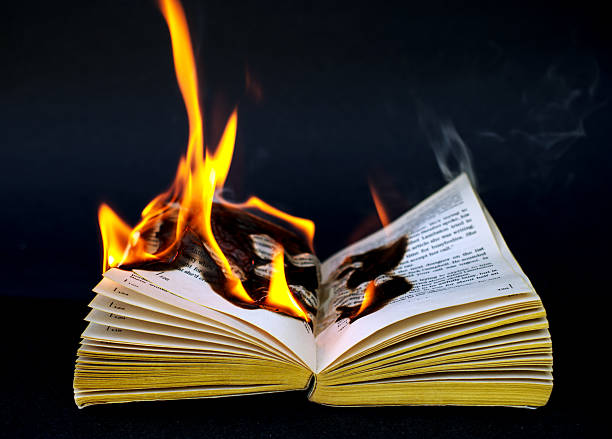In the early thirteenth century, the Mongol invasion destroyed an entire library of Bayt-ul-Hikma (House of Wisdom). The Catholic Vatican administration periodically destroyed many printed works by burning them. Adolf Hitler confiscated all books that did not conform to his views and burned them in squares. Only a few years back, Republican Turkey used to collect books from homes and destroy them.
The day before yesterday, a vagrant burned a copy of the Qur’an.
Really, why does one burn books? Is it to destroy all the copies by burning them? To destroy the ideas and advice in them? Of course not. Then let’s think a little more…
Is that a statement? Does it fall under freedom of expression? Nonsense! If he had an idea to express, he wouldn’t burn it, he would extinguish it. If he had an idea, he would express it; he would not try to destroy what is being expressed.
Books consist of pages on which human ideas, advice, messages, dreams or fictions, teachings are written. As the book is read, these contents spread into minds, take shape, are understood differently and shape people’s thoughts. The word is influential, and so is the book. Especially books with effective ideas, advice and fiction have the potential to make us completely different people. They can change our minds. They open the doors to ideas that we have not seen, have not thought about, and perhaps cannot think about. They force us to think differently than we have always thought.
Some books have the potential to change orders because they change thinking and memorization. Those who protect those orders, those who feed on those orders and systems, do not like such books. For them, the absence of those books is better than their presence. Some books build minds. Those who are used to living with other minds do not like those different minds. Therefore, they do not like the texts that build those minds. For them, it is better to destroy those books. Or some books build a culture, a civilization around them. Those who see that culture and civilization as enemies also see the book as an enemy and want to destroy it.
But these rarely make people burn books. Books and flags are burned as a declaration of war, as a show of opposition to the people who value those books and symbols. The aim is to provoke them, to show that you are disregarding their most precious possessions. This, for example, is the common message of the fools who occasionally attempt to burn holy books. Unfortunately, they are usually successful. The one whose book is burned attacks the one who burned it in anger; if he doesn’t attack, he denounces it in an uproar. So everyone is happy and the next books, flags and symbols are lined up to be burned when necessary…
But there is another emotion in burning a book. The one who burns the book is afraid of what is in the book. Because he is afraid, it is as if he wants to burn away the thoughts and messages that have not materialized, have not been realized. A fool who publicly sets fire to a text that a civilization ascribes sanctity to is actually afraid of that civilization. He burns with the desire to declare war on it, to destroy it. That fire first spreads to the book. It is the coward who burns the book. It is the weak who burns the book.
There are books that build a whole new mind in a person. For believing Muslims, the Quran is like that. We call it the Holy Quran. In other words, it is the most advanced, the most sophisticated of all that is read, all that is spoken. We know from that book that the universe is the one to be read, and the purpose of reading is the human being. It is an admonition pointing to the human being, a reminder. Its sacredness comes from what it points to.
But the reverence shown to that book is level by level. The one who is in touch with the content of that book, who lives its message, feels sorry for the one who tried to burn it. He grieves and suffers with his ignorance. On the other hand, those who think that the book is not its words but its letters, ink and paper, who hang it on their walls, arrange it in their bookshelves and show reverence to it in their own way, get angry, enraged and agitated at the person who burns the book out of fear. While that book advises to unite in reasoning and building, not in grudges and anger, it can turn into a dangerous pile burning with anger, as if applauding the one who burned the book, exactly as he wanted. They think they are doing this in the name of the sanctity of the book. They are already the addressees of the book-burner.
And then there are the political brazen ones who profit from the fact that “my book was burned”. These are system-fed, low and fallen types who have no capital other than sycophancy, who do not know how to exist without enemies. There are even those who appear to be opinion leaders but have no opinion at all. Most of them are despicable souls who are eager to reap material and moral profit from the enmity created by the act they condemn. They cannot refrain from pouring gasoline on the crowd’s rage and trying to turn their own nothingness into profit. These scoundrels are the bottom of humanity, the black sheep of this world.
Why does one burn books?
How can you not ask that question?
If this question does not asked, we will have no progress. If we don’t question, more books, more people will burn. This world, which was originally a paradise, will continue to be hell with this stupidity.


